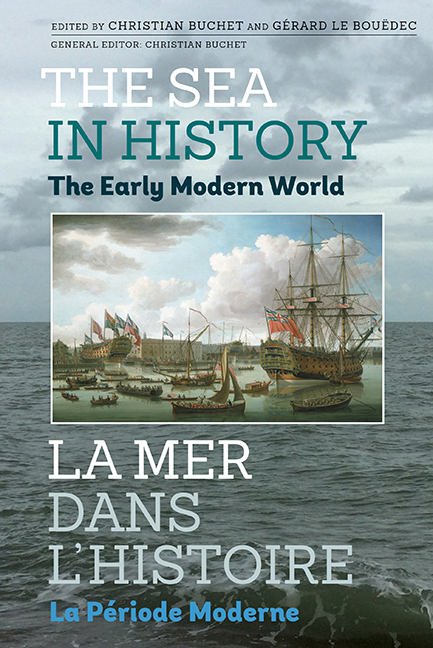Book contents
- Frontmatter
- Contents
- List of Illustrations
- List of Contributors
- Introduction générale et remerciements par
- General introduction and acknowledgements
- Introduction (français)
- Introduction (English)
- LA RÉUSSITE PAR LA MER:La reussite par la mer des territoires et des communautés littorales
- La construction d'un espace mondial: La circulation maritime et les ports
- La forte croissance de l'économie des pêches et des échanges
- Pêches méditerranéennes et développement de l'économie maritime
- The development of fishing fleets in the North Atlantic Ocean
- Les pêches morutières, terre-neuvières, baleinières en Amérique du Nord
- Salt trade in Europe and the development of salt fleets
- Les flottes du vin en Europe: transporter et négocier une marchandise à risque, XVIe-XVIIIe siècles
- L'affirmation de l'Europe baltique et scandinave au XVIIIe siècle
- Sugar and the slave trade in the development of Atlantic maritime trade
- Les flottes négrières de la traite atlantique
- Production and export of tobacco: the development of Atlantic maritime commerce
- Asia–Europe trade: the demand for Asian goods and long-distance shipping from the Indian Ocean and South China Sea
- Les acteurs de la dynamique maritime
- LA PUISSANCE MARITIME INSTRUMENT DE LA PUISSANCE POLITIQUE ET D'UNE STRATÉGIE GLOBALE DE RAYONNEMENT VOIRE DE DOMINATION: Les puissances maritimes occidentales
- L'océan Indien, entre convoitises et indifférences
- Les puissances maritimes asiatiques
- L'Afrique
- La politique maritime et l'idéologie
- Mer et développement technologique
- Développement maritime et maîtrise économique et financière
- Développement maritime et maîtrise organisationnelle
- Conclusion (français)
- Conclusion (English)
- Conclusion générale par
- General conclusion by
- Miscellaneous Endmatter
- Miscellaneous Endmatter
The development of fishing fleets in the North Atlantic Ocean
from La forte croissance de l'économie des pêches et des échanges
Published online by Cambridge University Press: 11 May 2017
- Frontmatter
- Contents
- List of Illustrations
- List of Contributors
- Introduction générale et remerciements par
- General introduction and acknowledgements
- Introduction (français)
- Introduction (English)
- LA RÉUSSITE PAR LA MER:La reussite par la mer des territoires et des communautés littorales
- La construction d'un espace mondial: La circulation maritime et les ports
- La forte croissance de l'économie des pêches et des échanges
- Pêches méditerranéennes et développement de l'économie maritime
- The development of fishing fleets in the North Atlantic Ocean
- Les pêches morutières, terre-neuvières, baleinières en Amérique du Nord
- Salt trade in Europe and the development of salt fleets
- Les flottes du vin en Europe: transporter et négocier une marchandise à risque, XVIe-XVIIIe siècles
- L'affirmation de l'Europe baltique et scandinave au XVIIIe siècle
- Sugar and the slave trade in the development of Atlantic maritime trade
- Les flottes négrières de la traite atlantique
- Production and export of tobacco: the development of Atlantic maritime commerce
- Asia–Europe trade: the demand for Asian goods and long-distance shipping from the Indian Ocean and South China Sea
- Les acteurs de la dynamique maritime
- LA PUISSANCE MARITIME INSTRUMENT DE LA PUISSANCE POLITIQUE ET D'UNE STRATÉGIE GLOBALE DE RAYONNEMENT VOIRE DE DOMINATION: Les puissances maritimes occidentales
- L'océan Indien, entre convoitises et indifférences
- Les puissances maritimes asiatiques
- L'Afrique
- La politique maritime et l'idéologie
- Mer et développement technologique
- Développement maritime et maîtrise économique et financière
- Développement maritime et maîtrise organisationnelle
- Conclusion (français)
- Conclusion (English)
- Conclusion générale par
- General conclusion by
- Miscellaneous Endmatter
- Miscellaneous Endmatter
Summary
ABSTRACT. Fish has long been an important component of the human diet. Commercial sea fisheries developed to meet the demand for this rich source of protein, as fishermen responded to market opportunities by catching marine animals, which were then processed and marketed for human consumption. Four broad types of sea fishery – offshore, migratory, inshore and shore – were undertaken by fishermen from at least 20 countries in approximately 50 North Atlantic fishing zones during the 1500–1800 period. The income, employment and food generated by such activities had a major impact on the economies and societies of the North Atlantic region.
RÉSUMÉ. Le poisson a longtemps été une composante importante de l'alimentation humaine. Les pêcheries maritimes commerciales se sont développées pour répondre à la demande de cette riche source de protéines, car les pêcheurs ont répondu aux opportunités du marché en capturant des animaux marins, qui ont ensuite été transformés et commercialisés pour la consommation humaine. Quatre grands types de pêcheries maritimes – hautières, migratoires, côtières et à pied – ont été entrepris par des pêcheurs issus d'une vingtaine de pays et opérant dans une cinquantaine de zones de pêche de l'Atlantique nord pendant la période 1500-1800. Les revenus, emplois et aliments générés par ces activités ont eu un impact majeur sur les économies et les sociétés de la région de l'Atlantique nord.
Fish is rich in protein, calcium, unsaturated fats and vitamins A, B and D. It has therefore been extracted from its natural environments by humans seeking supplies of food since the earliest times. The transformation of fish into food – of a naturally occurring lifeform into a marketable commodity – has entailed the deployment over many centuries of countless vessels and fishermen to locate and capture a piscine prey that is then returned to land for processing and consumption. This seemingly simple extractive process has had profound ramifications for human societies over the long term, for the quest for fish has driven human predators, carrying with them their beliefs, cultural practices and techniques, to move around the coasts and across the oceans. The development and operation of fishing fleets in the North Atlantic Ocean amply illustrates the significance of this quintessentially maritime activity.
- Type
- Chapter
- Information
- The Sea in History - The Early Modern World , pp. 224 - 233Publisher: Boydell & BrewerPrint publication year: 2017



